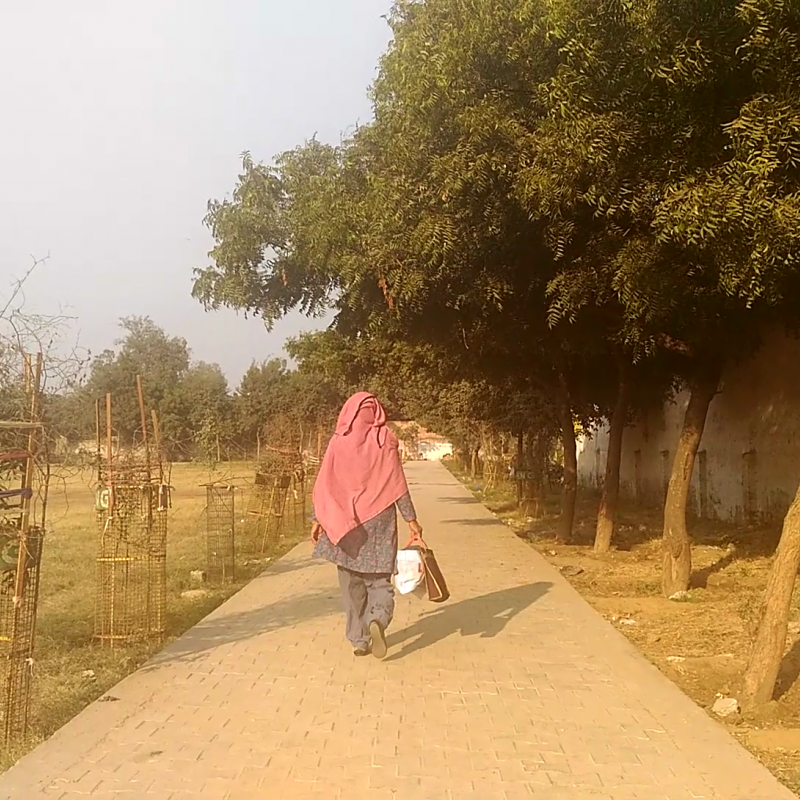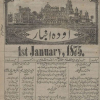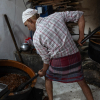The everyday geet (songs) of Haryanvi women which they sing through all the major and minor events of their life are called jakdi. As a result, jakdi geet comprise themes that pertain to every context imaginable in a married woman’s life. There are some jakdi geet that are about the unmarried life too, but the focus of this article is on songs that are about a woman’s married life, which is traditionally seen as the initiation of a woman into womanhood. These songs not only include the ones that younger women might hear, and imbibe, from the older women on various occasions, but also those that women twist and recast to fit their specific space and contexts. Apart from being sung at social occasions and gatherings these songs are especially known for being hummed while doing the daily chores.
In terms of being learned by heart by means of simple repetition, these songs are more easily picked up by the younger generation than other songs related to marriage rituals. These songs chosen for this article express the desire of a newly-wed woman to assert herself in a world that is alien to her. It is in this forthright manner that she plans to familiarise herself with the unknown. It is not going to be easy - the songs warn her. She is not going to give up - the songs remind us. Jakdi reflect the centrality of the family as a social unit. Some of these songs have a very joyous tone. They can even be danced on. However, some of the songs are sung very slowly in a doleful manner. For example, the following song expresses the discriminating ways in which sons and daughters have traditionally been perceived:
‘Bir ek maa ke jaaye re, lote the ek sareer, ke kismet nyaari nyaari re’
'Brother, we have very different fates even though our origins are from the same womb'.
The subject matter of all the songs is of a grave nature, but its treatment is often sarcastic and exaggerated. The problems of a married life, like harassment experienced from one’s in-laws is alluded to evasively. But singing the discontents, a woman uses an explicit form to express the implicit.
Below are five jakdi geet translated from Haryanvi to English that are related to the desires and experiences of a daughter-in-law. She is the speaker in all these songs. In the first one, she tells us about the gifts her husband got her from his travels. In the second one, she complains to her husband about his mother. She is sure that she wants a separate place she can claim as her own, as she cannot take her mother-in-law’s rants anymore. Note that this is a song from a time when moving out for a married son was looked down upon, as it not only meant that he was evading his responsibility to his family, but also giving in to the whims of his new wife. In the third song, a very cheeky daughter-in-law warns her mother-in-law to get ready to serve her as she will be the new mistress of the household. In the fourth jakdi, the daughter-in-law makes it very clear that she is not an object to be pushed around by the in-laws. She warns everyone of the consequences of any kind of ill behavior towards her. In the last song included in the article, the daughter-in-law establishes her will to be taken seriously, since a lot of important decisions are in her hand.
Very rarely is the song entirely dedicated to a man. He does make an appearance in the father/husband/brother/brother-in-law figures, but his appearance is more to do with the emotions it generates in the woman who is the speaker in the songs. He is addressed lovingly, reproachfully; he is complained about, complained to, and so on. But, in the songs sung by women about women, he does not get to play the protagonist.
In the following translated songs, some Haryanvi words have not been translated like jeath, the elder brother-in-law; devar, the younger brother-in-law; nanad is the sister-in-law; and, lastly, saas, or sasu, the mother-in-law. The songs below are both sung at marriage gatherings as geet and on a daily basis in villages where there are women who know them by heart. It is incredibly rare to see women sing these songs on a daily basis in urban spaces. It would be apt to call them songs of leisure as they are sung by women in their free time, or while working, or simply when a group of them gather to have tea and snacks. Reflecting the relatively slower lifestyle of the countryside, the tone of these songs is mellow when hummed daily. But the speed and mood picks up to transform them to dancing songs on marriage functions, or any other special gatherings.
The five songs placed below are a good way to begin understanding the kind of songs that comprise jakdi. In a fast paced world with little or no creative contact with one’s roots, and a lifestyle that has little space for such songs, their primary documentation and translation makes one marvel at their relevance in an urban context. This connection is marked not by tension, but by the possibility of cohabitation.
Jeath gya Dilli, devar gya Mumbai
kala gya ri, Kalkatte ki galiyaan
Jeath laya pede, devar laya laddu
kala laya ri kali gajar ka halwa
Jeath laya dhoti, devar laya kurta
kala laya ri kale kapde ka lehnga
Phat gayi dhoti phat gya kurta
khoob peha ri kaale kapde ka lehnga
Jeath laya ladka devar laya ladki
kalla laya ri kali kutiya ka pilla
Nyaaara ho gya ladka, byah gayi ladki
khoob khilaya ri kaali kutiya ka pilla
To Bombay my devar traveled, my jeath to Dilli,
he, whereas, roamed Kalkatta’s narrow winding alleys.
Jeath with pede, devar with laddu came back,
but he came back with carrot’s halwa so black.
They brought back a dhoti and a knee-length skirt,
For me he got a heavy skirt in black.
The dhoti and the shirt tore from front to back,
I continue to whirl my heavy skirt in black.
With the two, a boy and a girl came back,
But he brought back: a bitch’s pup black.
The children drifted away: married or grew up,
while I play on with the bitch’s black pup.
II
Tumhari maaye lade din raat, humse hoti na bardast,
Nyyara ho ja, nyaara ho ja bhartare.
Humne paiya choon bhatera, paratha tera ban jaye
Fulka mera bhi ban jaye, chooorma pappu ka bhi ho jaye
Nyyara ho ja, nyaara ho ja bhartare.
Ek paaiya doodh bhatera, coffee teri jo jaye
Chai meri ho jaye, botal pappu ki bhi bhar jaye
Nyyara ho ja, nyaara ho ja bhartare.
Humne ek nanad bhateri, rakhi teri bhi bandh jaye,
Jappa mera bhi kat jaye, jode pappu ke le aaye,
Nyyara ho ja, nyaara ho ja bhartare.
Mei toh apne sajhe sasur nei lungi dabba tera bhi de aaye,
Bhajji meri bhi le aaye, school pappu ko bhi chhod aaye
Nyyara ho ja, nyaara ho ja bhartare.
Enough with your mother who fights
me day and night.
Draw a line, husband,
draw it where it needs to be drawn.
A handful of flour is enough to make
paranthas as per your taste,
churma-roti on pappu’s and my plate.
Draw a line, husband,
draw it where it needs to be drawn.
A bowl of milk enough to fill up
your coffee-mug, my tea-cup,
and, lastly, pappu’s slipper.
Draw a line, husband,
draw it where it needs to be drawn.
Just one of your sisters would do
at child-birth for me, at rakhi for you
to bring pappu clothes brand new.
Draw a line, husband,
draw it where it needs to be drawn.
When we separate, I want your father
on my side to ferry you lunch, snacks
for me after dropping off pappu to school.
Draw a line, husband,
draw it where it needs to be drawn.
III
Gaya, gaya ri sasu tera raj, jamana aaya bahuan ka
sasu bechari paani bahran jave—bahu dekhn jaave
Bharo, bharo saasuji ghade char. Jamana aaya bahuan ka.
Sasu bechari madir jave, bahu dekhn jaave.
Karo, karo sasuji puja din char. Jamana aaya bahuan ka.
Sasu baechari rasoi banave, bahu dekhn jaave.
Paroso-paroso sasuji phulka char, jamana aaya bahuan ka.
Saas bechari palang bichave, bahu dekhan jaava.
Daabo, sasuji mhare paer jordar. Jamana aaya bahuan ka.
Gone are your days, dear saas, the reign of bahu has begun.
Poor saas fetches water from the well--
go on, fetch four more pails, the reign of bahu has begun.
Poor saas goes to temple everyday--
go on, pray for another four days, the reign of bahu has begun.
Poor saas keeps the kitchen spic and span--
go on, make fluffy roti some more, the reign of bahu has begun.
Poor saas makes the bed every night--
go on, massage my feet, use your might, the reign of bahu has begun.
IV
Gamme raja gamme, gamme mei jaan gava dungi.
Jo mera sasura kar pyaar sabh tareeke kara dungi
Jo mera sasura karein ladai sabh band kara dungi
Je meri sassu raji bole haath paer daba dungi
Jo meri saasu kare ladai roti ko tadpa dungi
Gamme raja gamme, gamme mei jaan gava dungi.
Jo mera jetha kare pyaar sare kaam kara dungi
Jo mera jetha kare ladai khat bahar bhicha dungi
Jo meri jithani karei pyaar baccho ne paal lungi
Jo meri jethani karein ladai chulha nyaara karva lungi
Gamme raja gamme, gamme mei jaan gava dungi.
Jo meri nanad karei pyaar jaldi byah kara dungi
Jo meri nanad kare ladai peehar aana jana chhuda dungi
Jo mera devar karei pyar choti behern byah dungi
Jo mera devar karei ladai college jana chudwa dungi
Gamme raja gamme, gamme mei jaan gava dungi.
Jo mera raja karei pyaar seja bichwa dungi
Jo mera dulha karei ladai duja byah kara lungi
Gamme raja gamme, gamme mei jaan gava dungi.
In sorrow, love, I will give up my life.
If your father is sweet, I will do as as he pleases.
But, if he with me fights, he will live in fright.
If your mother talks well, I will massage her feet.
But if she creates unrest, there would be no food for her at best.
In sorrow, love, I will give up my life.
If your elder brother lives with love, I will abide by him.
But if he puts me down, his bedding will be thrown out.
If his wife loves me, I will help her raise her little chicks.
If she messes around, our kitchen will move to different grounds.
In sorrow, love, I will give up my life.
If your sister is sweet to me, she will get my help to wed early.
But, if she is not good to me, I will make it hell for her to visit her maternal home.
If the younger brother is nice to me, I will wed my sister to him.
But, if he doesn’t behave all that well, then he’ll bid his college farewell.
In sorrow, love, I will give up my life.
If, I get all your love, I will welcome you to bed.
If no, then I will prepare it for someone else.
In sorrow, love, I will give up my life.
V
Choodiyan banglori meri haath mei
Saas bahu ki hui ladai chowk ke beech mei
Ladle saasu ladle belan toh mere haath mei
Choodiyan benglori mere haath mei
Nand bhabhi ki hui ladai bazaron mei
Ladle nanad lad le batua toh mere haath mei
Choodiyan banglori meri haath mei
Devar bhabhi ki hui ladai panghat pe
Devar ladle ladle, neju toh mere haath mei
Choodiyan banglori meri haath mei
Raja rani ki hui ladai,
ladle raja ladle, bael badhana toh mere haath mei.
Choodiyan banglori meri haath mei
Bangles in my hand from Bangalore
Saas-bahu got into a fight
in the middle of a chowk.
Roll your tongue as much as you want, mother dear,
but the rolling pin is still in my hand,
so, don’t bother.
Bangles in my hand from Bangalore
Nanad-bhabhi quarrel in the bazar
Bicker all you want, little sister,
but, it is me who plays the purse strings,
so don’t bother.
Bangles in my hand from Bangalore
Devar-bhabhi fight at the well,
tease me all you want, dear brother,
the rope that pulls water is in my hands,
so, don’t bother.
Bangles in my hand from Bangalore
The newly weds in their beds disagree.
Say what you will, dear husband,
but, I alone decide the growth of this tree.
Bangles in my hand from Bangalore
Glossary
I
Kalkatta is Kolkata.
Pede is a white sweet made from milk and sprinkled with pistachios.
Laddu is a red or yellow colour sweet.
Halwa is made from whole wheat flour, or semolina, with lots of rarefied butter and sugar. But, if made with carrots in the winters, it is called both gajar ka halwa and gajar pak. In the song above, the black before the carrot is most probably added to keep up with the repetition of a certain blackness in every stanza. However, it might be a far-fetched reference to beetroot which has a blackish-red color.
Dhoti was worn by men in Haryana and nearby regions, but is fast disappearing as a clothing choice. Dhoti refers to the way a piece of cloth is wrapped around the legs for comfort and easy mobility. It is not be confused with lungi from South India.
II
Churma is made by kneading steaming hot chapaatis, called roti in Hindi, in rarefied butter, ghee in Hindi, and crushed jaggery, shakkar.
Pappu most likely is the name by which the couple call out to their son lovingly. It is a term rarely used for a female child.
Rakhi is an abbreviated term for raksha bandhan. It is a festival in which sisters tie a string/band on their brother’s hand. The band is called rakhi.
III
Saas refers to mother-in-law. Bahu refers to daughter-in-law.
V
The song is possibly a reference to the bangles that the speaker, the daughter-in-law of the house received from her husband from his travels to Bangalore. This signifies her importance as a decision-maker, because her husband, the son of the house, listens to her. As a result, he is more likely to prioritise her opinions and suggestions. However, in the last lines, the speaker asserts her power over the husband too, when she reminds him that whether to procreate or not-to-procreate is her choice; so he, the husband, better listen to her. In such a scenario the bangles in her hand from Bangalore signify much more than her favorable position due to her husband’s closeness to her. They symbolise her new-found confidence in asserting her choices as her own. Her personhood becomes the source from which she draws legitimacy, not from the position of being a wife.
Nanad refers to one's husband's sister. Bhabhi refers to one's brother's wife. Devar refers to a younger brother-in-law.













